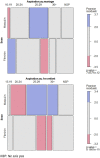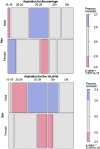Effets identitaires de la socialisation différentielle de genre sur les aspirations au premier enfant et au mariage des jeunes adolescent(e)s à Ouagadougou: une étude mixte
- PMID: 38294681
- PMCID: PMC10833111
- DOI: 10.1080/26410397.2023.2294824
Effets identitaires de la socialisation différentielle de genre sur les aspirations au premier enfant et au mariage des jeunes adolescent(e)s à Ouagadougou: une étude mixte
Abstract
Studies show that gender socialisation shapes differently the gendered identity, self-esteem, and sexual behaviours of girls and boys. While pre-adolescence is viewed as a pivotal period for gendered socialisation, few studies in francophone Africa investigate the role of gender identity effects on aspirations and sexual and reproductive behaviours at this life stage. This article explores how the internalisation of gender stereotypes during socialisation is linked to the aspirations of girls and boys for certain life events, such as having their first child or getting married. A survey was conducted in 10 primary schools in Ouagadougou, among pupils aged between 9 and 16 years, as well as seven focus group discussions with their parents. The findings indicate a gender-based variation in the effects of adherence to unequal gender norms among young adolescents. As a result, girls tend to have earlier aspirations towards marriage and later aspirations for childbearing, while boys show earlier aspirations for childbearing and later ones for marriage. These effects may expose both girls and boys to risks of poor sexual and reproductive health. Interventions promoting egalitarian gender norms could boost girls' self-esteem as well as mutual respect among young adolescents of both genders, aiming to improve their sexual and reproductive health during adolescence and into adulthood.
RésuméDes études montrent que la socialisation de genre développe différemment chez les filles et les garçons leur identité sexuée, leur estime de soi et leurs comportements sexuels. Alors que la préadolescence est considérée comme une période charnière de la socialisation genrée, peu d’études en Afrique francophone questionnent le rôle des effets identitaires de genre sur les aspirations et les comportements sexuels et reproductifs à cette étape de vie. Cet article examine la manière dont l’intériorisation des stéréotypes de genre au cours de la socialisation est associée aux aspirations qu’ont les filles et les garçons pour certains événements de leurs vies comme avoir un premier enfant ou se marier. Une enquête a été réalisée dans 10 écoles primaires de Ouagadougou, auprès d’élèves âgé(e)s entre 9 et 16 ans, ainsi que sept discussions de groupes avec leurs parents. Les résultats montrent une variation selon le sexe des effets de l’adhésion aux normes de genre inégalitaires chez les jeunes adolescent(e)s. Cela a pour conséquence de développer des aspirations, chez les filles plus précoces au mariage et plus tardives à l’enfantement, et chez les garçons, plus précoces à l’enfantement et plus tardives au mariage. Ces effets peuvent exposer les filles et les garçons à des risques de mauvaise santé sexuelle et reproductive. Des interventions promouvant des normes égalitaires de genre pourraient renforcer l’estime de soi des filles ainsi que le respect mutuel entre les jeunes adolescent(e)s des deux sexes afin d’améliorer leur santé sexuelle et reproductive à l’adolescence et à l’âge adulte.
Keywords: Ouagadougou; effets identitaires; gender socialisation; identity effects; jeunes adolescent(e)s; santé sexuelle et reproductive; sexual and reproductive health; socialisation de genre; young adolescents.
Figures









References
-
- World Health Organization, UNICEF . The reproductive health of adolescents: a strategy for action: a joint WHO/UNFPA/UNICEF statement. World Health Organization; 1989.
-
- Chandra-Mouli V, Akwara E, Engel D, et al. . Progress in adolescent sexual and reproductive health and rights globally between 1990 and 2016: what progress has been made, what contributed to this, and what are the implications for the future? Sex Reprod Health Matters. 2020;28(1):1741495. doi:10.1080/26410397.2020.1741495 - DOI - PMC - PubMed
-
- World Health Organization . Global Accelerated Action for the Health of Adolescents (AA-HA!): guidance to support country implementation. 2017
-
- UNICEF . Harnessing the power of data for girls: taking stock and looking ahead to 2030. NY UNICEF. 2016. Available from: https://data.unicef.org/resources/harnessing-the-power-of-data-for-girls/
Publication types
MeSH terms
LinkOut - more resources
Full Text Sources
Research Materials
